Read all or skip to the section you want to read.
NOTRE DAME FCU TOGETHER CREDIT UNION TRAILHEAD CREDIT UNION USC CREDIT UNION BORDER FCU FAITH COMMUNITY UNITED CREDIT UNION UNIVERSITY FCU
Credit unions provide access to basic financial services to people of modest means. This is why they exist. Forged by long experience in helping members navigate waves of economic disruption, credit unions now face a set of circumstances and opportunitiesthe likes of which they’ve never seen.
The nation’s member-owned financial cooperatives have turned out a decade of unprecedented growth. Now, how can they respond to the dual challenges presented by a pandemic-battered economy and the imperative to ensure inclusion and equality in allaspects of social life, including financial?
Leaders from a diverse group of credit unions have more than a few ideas about how the movement can help from fee waivers, loan deferrals, new loan products, and payroll protection to volunteer tax return preparation, Habitat for Humanity projects,community partnerships for job development, and diversity, equality, and inclusion (DEI) initiatives.But most of all, these leaders emphasize the importance of adapting the core credit union mission of people helping peopleto today’s pressing circumstances.
Notre Dame Federal Credit Union
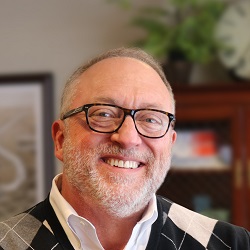
Tom Gryp, President and CEO, Notre Dame FCU
Tom Gryp has been president and CEO of Notre Dame Federal Credit Union($843.0M, South Bend, IN)since 2010.
How can credit unions help Americans solve the problems such as unemployment, housing and education affordability, and economic inclusion they face today?
Tom Gryp: As a cooperative, a credit union empowers otherwise disenfranchised groups to unite for their common financial benefit. But the sad truth is, many credit unions have abandoned this fundamental mission and relegated it to nothingmore than a snappy marketing slogan.
Why do so many people say they don’t know the difference between a bank and a credit union? Because there is no material difference!
So, how do credit unions address these significant societal issues? We must go back to our roots. Forego optimal operational efficiencies and decentralize. Train and empower really empower front-line staff to identify and solve memberproblems.
Look at how we approve loans. Focusing on all those data points in scoring models minimizes, and mostly ignores, the human being. By discarding that, credit unions abdicate their fundamental reason to exist.
Bend the rules or break them, even when it’s the right thing to do. Care for the human being, and consider the person standing in front of us more important than robotically following processes, procedures, and rules.
How have recent events changed your thinking about these issues?
TG: They’ve helped make even more clear to me the thoughts I expressed above. All of this should be a profound wake-up call to our industry. Credit unions were created to address issues such as these.
The only way to solve societal issues like these is to help folks one person at a time. One credit union and one person becomes two, then four, then an entire industry, and, finally, society. Only then will things begin to change permanently and structurally.
Together Credit Union
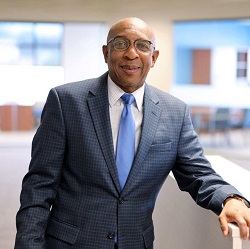
Larry Sewell, VP of Corporate Partnerships & Advocacy, Together Credit Union
Larry Sewell has been with Together Credit Union($2.0B, St. Louis, MO) for 25 years, the past four as vice president for corporate partnerships and advocacy.
How can credit unions help Americans solve the problems such as unemployment, housing and education affordability, and economic inclusion they face today?
Larry Sewell: Credit unions must continue to communicate to their members and consumers that we are here to help.
This pandemic and all of the terribly violent criminal acts against African Americans have wreaked havoc within our communities and on the economy. Credit unions are in a unique position to take a stand to eliminate some of these inequities.
Credit unions must remain active participants within the communities they serve. They must put in action the not for profit, not for charity, but for service purpose statement. Credit unions need to continue to show their members that wecare about their entire wellbeing, not just their financial wellbeing. We must strongly advocate for the underserved and underrepresented.
Credit unions should also be intentional when it comes to recruitment, development, and advancement of talent. By intentional, I mean approach all aspects of the people process with diversity in mind. If a credit union’s membership is diverse, itsmanagement, staff, and board should also be diverse. We need to look around the table and challenge ourselves to be more inclusive and more equitable.
How have recent events changed your thinking about these issues?
LS: For credit unions, the motto of people helping people is a fantastic opportunity to show how we value all people.
The recent and ongoing hateful acts of violence in our country have not really changed my thinking regarding how certain groups of people are treated, particularly African Americans. This has been a systemic problem in our country for hundreds of years.The time has come for this mistreatment to end. The diversity among the peaceful protesters has been a pleasure to witness.
It is my hope these disgusting acts of racism will shine a brighter light on how unjust African Americans have been treated throughout our history. No group of people, or any individual, should be marginalized like this.
African Americans have always faced challenges in housing, unemployment, education, and economic inclusion. Credit unions are beginning to galvanize and commit to eradicate this lack of equality, thereby creating a more equal society.
A stronger commitment to diversity, equity, and inclusion should be a strategy for every credit union, league/association, and trade association. The African American Credit Union Coalition, and its many partners, have made a public commitment to uniteagainst racism. The coalition invites others to join in this important and much needed initiative.
Dozens of credit unions and related organizations have pledged to help the industry meet the diversity, equity, and inclusion challenge. Learn more in Organizing Strength Into Compelling Power.
Trailhead Credit Union

Toni Mathews, VP of Operations, Trailhead Credit Union
Toni Mathews has been with Trailhead Credit Union($137.3M, Portland, OR) for eight years, the past two as vice president of operations.
How can credit unions help Americans solve the problems such as unemployment, housing and education affordability, and economic inclusion they face today?
Toni Mathews: Credit unions have historically bridged socioeconomic gaps. With this in mind, credit unions can collectively improve financial inclusion opportunities for individuals and businesses by focusing on the needs of marginalizedcommunities and members.
Anticipating obstacles that might impede underserved communities’ access to or the usefulness of credit union products and services is critical. Credit unions can analyze their own processes and identify deficiencies by asking reflective questionson how to improve their strategies that will aid those most affected by today’s societal adversities, including the challenges listed above.
Questions to pose: Are we marketing to an inclusive audience, e.g., in publications or resources that those we want to assist view? Are we receiving feedback that our cooperative wishes to focus on? Are we offering products that are not viable to thesecommunities, and how can we make them practical, easy to use, and accessible?
With the purpose to encourage and implement tangible changes, these questions can help identify exclusive perceptions and systems to change which will ultimately lead to more solutions.
How have recent events changed your thinking about these issues?
TM:With the economic challenges resulting from COVID-19 and the powerful response to the racial inequality movement, Trailhead’s leadership team is committed to improving and cultivating a genuinely inclusive environment throughaction and palpable change and to better serving the small business community here in Portland.
Of course, this is just the beginning. Decentering white-centric models that are predominant in our institutions will take serious unpacking; recent events have illuminated the undeniable necessity to do so, actively and aggressively.
Additionally, COVID-19 has spurred the development of increased virtual options for both staff and membership and created a need for financial support for small-businesses impacted by restrictions.
Trailhead has modified the agenda for our upcoming planning session to focus on DEI and a representation strategy as the main emphasis for 2021; we are committed to developing a long-term DEI approach and program for staff. This work will need to be deliberateand empathic, and we will need to embrace the obligation to challenge our systems.
Five credit union leaders share how their shops handled sudden change and soaring needs by adapting people, processes, and products. Read more in Lending Pros Share Pandemic-Fueled Lending Lessons.
USC Credit Union
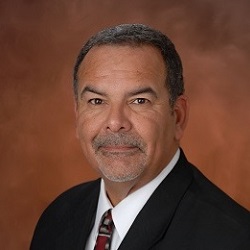
Gary Perez, President and CEO, USC Credit Union
Gary Perez joined USC Credit Union($659.6M, Los Angeles, CA) as president and CEO in 1988.
How can credit unions help Americans solve the problems such as unemployment, housing and education affordability, and economic inclusion they face today?
Gary Perez: I’d love to see credit unions embrace the proposal from Maurice Smith [CEO of Local Government FCU and Civic FCU as wellas former CUNA Board Chairman] to make DEI the eighth cooperative principle and to adopt DEI as both a cultural pillar and a strategic imperative.
In so doing, we can work with fellow credit unions, CDFIs, and minority depository institutions to compete for government, corporate, and non-profit grants that can serve as loan loss and operational support backstops. That will trigger more aggressivelow-cost lending and transaction services to help members and potential members in the midst of our concurrent health, economic, and racial injustice challenges.
Examples might include long term/low cost (1) loans to renters unable to make their rent payments due to COVID-related job loss, (2) student loans to young people seeking a better future through education, (3) student loan refinancing to those saddledwith crushing student loan debt, (4) consumer and mortgage loans to creditworthy borrowers with non-traditional income, credit histories, or citizenship status, (5) loans to help members escape the vicious payday lending cycle, and (6) business loansto help minority- and women-owned businesses expand and compete.
Click here to discover checking products, advance loans, credit builder programs, and more products that USC Credit Union has developed to help reach new members and put existing members in a better financial state.
How have recent events changed your thinking about these issues?
GP: It’s less about changing my thinking on the issues than it is about inspiring me and millions of others to intentionally and proactively act on our thoughts and beliefs.
Candidly, I’m ashamed and embarrassed that it took the latest of centuries of tragic murders of Black men and women to prompt me, USC Credit Union, and most but certainly not all credit unions in the nation to fully engage in thoughtfuldialogue and, more importantly, in the earnest identification and implementation of meaningful measures that promise to have a profound impact on our members and the communities we serve.
Border Federal Credit Union
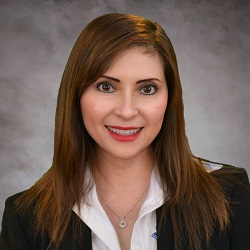
Maria Martinez, President and CEO, Border FCU
Maria Martinez has been president and CEO of Border Federal Credit Union ($193.3M, Del Rio, TX) since 1994.
How can credit unions help Americans solve the problems such as unemployment, housing and education affordability, and economic inclusion they face today?
Maria Martinez: Credit unions don’t see members as a number. Border FCU listens to members who face a hardship, and we offer all the traditional products and services a consumer needs; plus, we offer free financial counseling services to members and even to non-members who reach out to us for help. Our financial counselors are trained and certified to identify problem areas in people’s financial lives and to develop tools and programs for someone to get back on track financially.
Credit unions have always been known as financial rescuers and, lately, as financial first responders. This is because we are always there to help our members and our communities.
How have recent events changed your thinking about these issues?
MM: It’s important we don’t forget the human factor. We need to be more hopeful, more committed, and more dedicated to the basic challenges of living in a complex environment.
Now more than ever we need to be well-equipped to serve our members’ financial needs. We must take into consideration their habits and in many cases the lack of access to resources or tools needed to transact business in a digital or automated environment.
Our members trust us. Many of them see us as their champion because, amid the recent events, we were always there for them. Our industry is more important than ever.
You Might Also Enjoy
-
Maria Martinez On Leadership
Faith Community United Credit Union
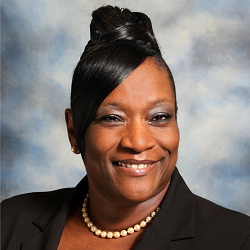
Jackie Moore, President and CEO, Faith Community United Credit Union
Jackie Moore has been with Faith United Community Credit Union($14.4M, Cleveland, OH) for 36 years, the past four as CEO.
How can credit unions help Americans solve the problems such as unemployment, housing and education affordability, and economic inclusion they face today?
Jackie Moore: Being member-owned makes credit unions a major solution for challenges facing American society. We don’t have major stockholders dictating dividends and interest rates. Our members make up our board of directors.
This gives our communities an employment advantage. We often hire within the community, train individuals on financial skills, and promote affordable, sometimes free, educational classes. We offer home-buying seminars and programs to help cover down paymentsand build credit.
We also have partnered with our business members to connect members with new jobs in the community. This helps create wealth within the community. The businesses are in the community, and the residents work for the businesses. The credit union, also,is in the community where members make deposits and the credit union gives loans. In this way, a circle of wealth is slowly created.
We promote economic inclusion. Without credit unions and our community partners, many of our members could not survive.
How have recent events changed your thinking about these issues?
JM: They’ve increased my already existing belief in uniting communities. We cannot make a change without all communities coming together to change systemic racism, poverty, police brutality, and other major social issues.
Credit unions have stepped up with speaking out on these issues. Faith Community even offers training and open discussion on racial tensions in the workplace.We are a CDFI, which gives us access to grants and networking with organizations fighting for the same causes.
It’s sad it took a pandemic to open the eyes of our society. However, now we know the need and can make the necessary changes.
University Federal Credit Union
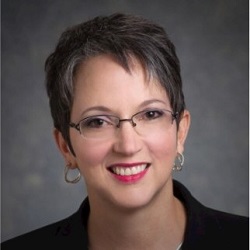
Heather McKissick, SVP of Community Impact, University FCU
Heather McKissick joined University Federal Credit Union($3.1B, Austin, TX) in 2013 and has been senior vice president of community impact since 2019.
How can credit unions help Americans solve the problems such as unemployment, housing and education affordability, and economic inclusion they face today?
Heather McKissick: First, credit unions can come from a place of deep empathy and focus on understanding not just what members but also our whole community is facing.
The fact the credit union movement was built on and around the concept of people helping people, especially those of modest means, is a spectacular foundation to stand on as we examine issues like housing, employment, education, financial inclusion, and,really, financial democracy.
How have recent events changed your thinking about these issues?
HM: Our board committed the credit union to addressing these issues in a two-year study that specified the areas in which we as a member-owned financial cooperative want and need to make an impact. In April 2018, our board concluded thattwo-year process by signing off on a motion that pivoted UFCU into being a social purpose credit union.
University FCU considers community needs and institutional strengths to identify high-impact areas of service. Learn more in Financial Health Underpins A Broader Social Purpose At A Texas Credit Union.
That thorough examination of the needs of our members and our community helped us identify three areas of particular need and became a strategic focus for us. These key issues employment, education, and housing affordability help drive financial health individually and across the community.
Since 2016, my entire job and our major focus as a credit union has been to examine how we can help the board achieve that vision. So, in that sense, not much has changed as a result of recent issues. We were already there.
What has changed is that, because of the pandemic, we’re approaching those issues through a lens of immediate need while at the same time not losing sight of the systemic issues that lie underneath those immediate needs.
These interviews have been edited and condensed.
